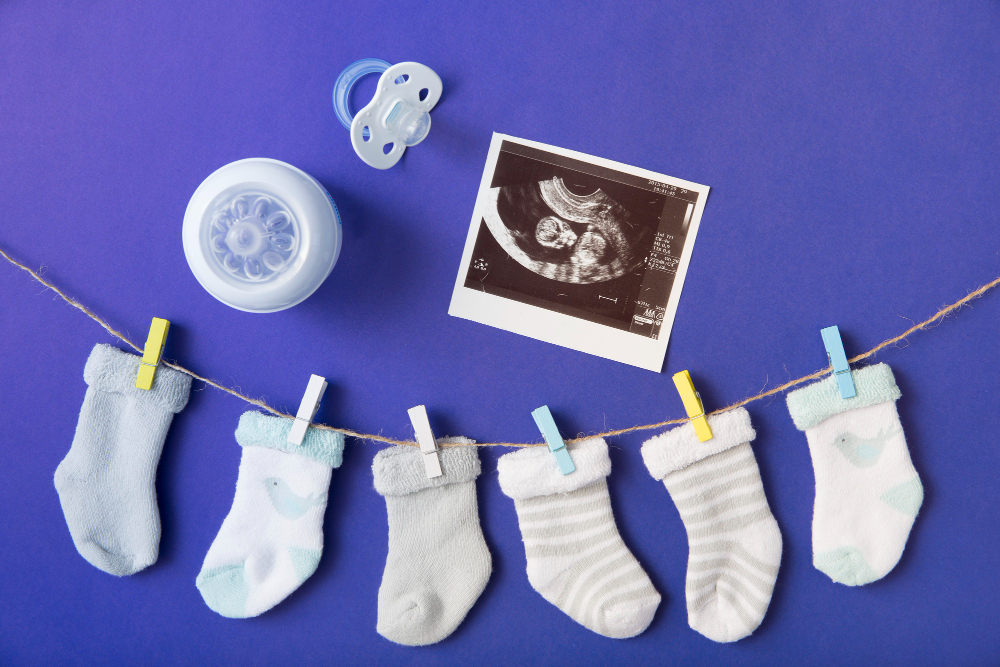Toddler

5 Sleeping Tips for Teething Babies
As a new mom, you’re likely to encounter a flood of parenting advice that can be overwhelming. Your little one might experience considerable discomfort during teething, leading to disruptions in their sleep patterns. Consequently, we would like to share some valuable tips to help teething babies get a good night’s sleep.
Make Sure The Baby Has Something Cold To Chew On
Cold has the ability to desensitize nerves, thereby diminishing pain sensation. This is why in recent times, many toy manufacturers have begun producing teethers with rubber or gel-core components that can be placed in the refrigerator. These teethers are specially designed for teething babies and are intended to be gnawed upon. The act of a baby chewing on these teethers exerts gentle pressure on their emerging teeth, offering them relief from the discomfort associated with teething. The inclination to chew as a means of alleviating teething pain is an instinct shared by both humans and animals.
Massage The Gums
When your baby begins teething, they may resist sleeping alone. When you place your baby in their crib, try gently massaging their gums with your finger. This soothing touch can alleviate discomfort and assist in getting your baby to sleep. If your baby wakes up during the night, you can repeat the gum massage. As you massage your baby’s gums, you’ll be able to sense where their new teeth are emerging. Concentrate on massaging these specific areas. It’s essential to ensure that your fingers are clean before massaging your baby’s gums for hygiene and comfort.
Create A Peaceful Atmosphere
Establishing a consistent sleeping schedule is crucial for helping your baby get a good night’s sleep. When babies have a regular sleep routine, their bodies adapt accordingly. A bedtime ritual can naturally induce drowsiness as bedtime approaches. It subliminally communicates that it’s time to sleep when specific activities are carried out in a predictable sequence, much like the way habits are formed. This routine might encompass elements such as giving your baby a warm bath, changing into pajamas, reading a brief story, singing to your baby, or gently rocking them in your arms until they drift off to sleep.
Breastfeed Is A Great Option For Teething Babies
Breastfeeding has a calming effect on your baby. However, as teething babies, they may sometimes nibble on your nipples, which can be uncomfortable or painful for you. To avoid this, consider massaging your baby’s gums before each feeding session. Breastfeeding remains an effective method for soothing your baby and helping them drift off to sleep peacefully.
Use Pain-killing Prescription
Only consider this option as a last resort if you’ve exhausted all other methods without achieving any improvement. Pain relievers can be effective in easing your baby’s discomfort and helping them sleep. However, it’s imperative to consult with your doctor before considering medication. Avoid purchasing over-the-counter pharmaceutical products for this purpose. Pain relievers like Ibuprofen are available in specially formulated, diluted versions designed specifically for children and infants. Never administer adult pain relievers to your baby. Always seek guidance from your pediatrician before giving any medication to your little one.
In conclusion, navigating the challenging waters of teething with a baby requires patience, understanding, and a few clever tricks up your sleeve. The five sleeping tips for teething babies outlined in this blog post offer a lifeline for exhausted parents, helping both little ones and caregivers get the rest they need during this trying time.

Why January Born Babies Are So Special?
The start of a new year brings with it fresh beginnings, resolutions, and a sense of renewal. But did you know that those born in the first month of the year, January, hold a special place in the world? January born babies are more than just the first arrivals of the year; they come with a bundle of unique traits and characteristics that make them truly remarkable. In this article, we’re going to explore what makes January born babies so special and why they stand out from the crowd.
Determination and Resilience
January born babies inherit the determination and resilience associated with the beginning of the year. Just like the cold and crisp January mornings, these individuals exhibit a strong sense of perseverance. They are not ones to give up easily and are known for their ability to weather challenges with a steadfast attitude. This determination often propels them to achieve their goals, even in the face of adversity.
Natural Leaders
One of the standout qualities of January born babies is their innate leadership skills. Perhaps it’s the influence of the Capricorn zodiac sign that dominates the majority of January, but individuals born in this month tend to possess strong organizational abilities and a practical approach to problem-solving. They are often sought after in leadership positions due to their ability to guide and inspire others with their wisdom and discipline.
Creativity and Imagination
Amidst the winter chill, the minds of January born babies are ignited with creativity and imagination. Research suggests that individuals born in January tend to have a higher likelihood of pursuing careers in the arts, music, or writing. Their ability to think outside the box and approach situations from unique angles stems from their imaginative nature, setting them apart as innovators and visionaries.
Thoughtful and Compassionate
The winter season encourages a sense of togetherness and compassion, and January born babies embody these qualities to the fullest. Their empathetic nature makes them excellent listeners and friends. They often go out of their way to support and uplift those around them, making them cherished companions in both good times and bad.
Balanced and Practical
Much like the yin and yang symbol, January born babies possess a remarkable sense of balance. Their practicality is paired with a deep sense of introspection. They are capable of analyzing situations from multiple perspectives, leading to well-informed decisions. This unique blend of practicality and inner wisdom allows them to tackle life’s challenges with a grounded approach.
Goal-Oriented and Ambitious
New Year’s resolutions are synonymous with the month of January, and it’s no surprise that those born during this month carry the spirit of goal-setting throughout their lives. January born babies tend to set high standards for themselves and are motivated to achieve their ambitions. Their disciplined nature ensures that they work tirelessly to reach their aspirations, inspiring others along the way.
From determination and creativity to compassion and ambition, January born babies encompass a diverse range of extraordinary traits. The influence of the month they are born seems to shape their personalities in unique and remarkable ways. As we celebrate new year, let’s also celebrate the presence of these individuals who enrich our lives with their qualities. Whether you’re a January born or you know someone who is, there’s no denying the spark that sets them apart.

What is The Age at Which Babies Can Drink Water?
As your baby continues to grow, you might find yourself pondering the appropriate timing for introducing water into their diet. You might question whether breast milk or formula suffices to keep them hydrated or if they require additional hydration. While you may have heard that water is discouraged for babies under 6 months, you might be interested in potential exceptions. Given the various developmental phases a baby experiences in their first year, it’s natural to feel uncertain about transitioning to new stages, especially considering the evolving recommendations for infant feeding.
In our quest for clarity, we consulted experts to gain deeper insights into when babies can drink water, the suitable quantity of water, and how to handle situations where a finicky baby shows an aversion to water.
At What Point Babies Can Drink Water?
During the early stages of infancy, babies often exhibit heightened hunger, especially during cluster feeding. You may wonder whether your baby’s fussiness is caused by thirst as a parent. Water is not recommended for infants under 6 months of age, however.
Unlike adults, babies don’t require water for hydration as they obtain the necessary fluids through alternative sources. Thus, if your 6-month-old baby initially shows little interest in water, you can be reassured that the intake of breast milk or formula will adequately address their thirst.
Why Is Water Not Recommended for Babies Under 6 Months?
Introducing water to infants below the age of 6 months carries certain risks. Most notably, if a baby fills up on water, it could hinder their ability to consume essential nutrients. Providing water to infants at this stage increases the likelihood of reduced intake of breast milk or formula, thereby depriving them of vital nutrients.
Sustaining a regular feeding schedule of formula or breast milk is vital for ensuring optimal growth in infants, supplying them with the essential vitamins their bodies require. The American Academy of Pediatrics (AAP) offers guidelines for feeding infants: at 6 months, babies might consume up to eight ounces of formula and/or breast milk every four to five hours.
Parents should also exercise caution regarding the quantity of water given to babies under one year of age. The safest approach is to entirely avoid offering water to babies aged less than 6 months.
Are There Any Situations Where Babies Can Drink Water?
Parents might contemplate exceptions to this rule. For instance, what if a baby is dealing with constipation or running a fever? Can water be administered in such cases?
However, medical experts unanimously discourage giving water to babies below 6 months of age, even if they seem uncomfortable due to constipation or fever. In such scenarios, babies are better off increasing their intake of breast milk or formula to address their needs.
Nevertheless, it’s imperative to seek guidance from a pediatrician or healthcare professional before introducing anything other than breast milk or formula to a young baby. If your baby displays signs of fever or constipation, consulting a healthcare professional is recommended.
